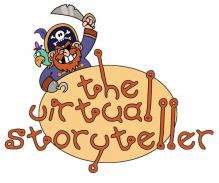(PhysOrg.com) -- It's a wonderful thing to be carried away in a story, but will you as the reader soon be able to determine how the story unfolds? With the Virtual Storyteller, developed by Ivo Swartjes at the Centre for Telematics and Information Technology of the University of Twente, the Netherlands, the reader will soon be able to take an active role. What he or she does determines how the story progresses. The key to making this possible is to devise intelligent software, so that the 'storyteller' is also prepared for unexpected situations.
The 'Virtual Storyteller', developed by Ivo Swartjes of the University of Twente, is a computer-controlled system that generates stories automatically. Soon it will be possible for you as a player to take on the role of a character and 'step inside' the story, which then unfolds on the basis of what you as a player do. In the gaming world there are already 'branching storylines' in which the gamer can influence the development of a story, but Swartjes' new system goes a step further. The world of the story is populated with various virtual figures, each with their own emotions, plans and goals. 'Rules' drawn up in advance determine the characters' behaviour, and the story comes about as the different characters interact. In developing the 'Virtual Storyteller', Swartjes began by investigating whether people enjoyed playing a part in this type of story, before going on to research the conditions and rules for the software.
Improvised theatre
The PhD student drew inspiration from improvised theatre to find out whether people enjoyed playing in an improvised story. Using a specially developed chat programme, he created a fictional world inhabited by two improvising actors and a test subject. The subject knew nothing in advance of what would happen, while the actors only knew that a story had to be created. These experiments showed that the test subjects very much enjoyed participating in the story. They especially liked the collaboration, and taking decisions on the spot.
Writer
How can you then translate this way of working into rules that determine the behaviour of the characters, so that 'natural' interaction is generated and with it a story is created? The 'Virtual Storyteller' can work with a number of scenarios, but there will still always be surprise events. To take account of these unpredictable scenes, the developers have to constantly seek out additional rules of behaviour. The author therefore does not write the stories, but devises the rules that determine what happens within them.
From games to bringing bad news
Virtual storytellers can make computer games even more advanced: the gamer has even more influence on how the game progresses than is now the case. But Swartjes also sees applications outside of the entertainment industry. The technology could also be used in management training, for example, or in rehearsing difficult situations such as bringing bad news. Swartjes expects that in five years time the new concept will be applied in a wide range of situations.
Provided by University of Twente





















